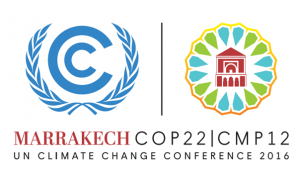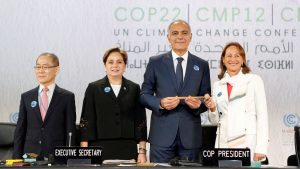
High expectations were created for the 22nd Conference of Parties (COP 22) and the main reason for those was the rapid entry into force of the Paris Agreement on November 4, only after 11 months of its adoption in Paris. However, during the first week of the COP, the election of Donald Trump as the new U.S. president brought uncertainties, as he denied climate change science during the U.S. election and promised to retire the U.S. of the Paris Agreement.
This scenario produced declarations reiterating the Paris Agreement as the Parties affirmed its commitment to its full implementation under the Marrakesh Action Proclamation and reaffirmed specific commitments already included in the Paris Agreement, such as the USD $100 billion mobilization goal.
COP 22 was not actually about a “COP of action” as it initially was labelled by several stakeholders In fact, it was more about a COP of protection of the Paris Agreement and an opportunity for other countries to take the lead in actions against climate change. The international community joined forces to act against policies that do not believe in climate change. Not only China ratified its support but also nearly 200 countries reaffirmed their commitment towards the Paris Agreement.
For instance, with regards to the countries most vulnerable to climate change, a shift in its role was evident. For the first time, these countries did not have as their priority to request funds for the implementation of its climate change commitments, since they were ready to move to the front line of climate change and take ambitious leadership. In that sense, on the last day of the COP, November 18, the Climate Vulnerable Forum, a group of 48 countries highly vulnerable to the effects of climate change, launched its vision and commitment to phase out fossil fuel in their countries between 2030 and 2050.
Even though the most polluting countries are not part of this initiative, this shows that countries all over the world are ready to take action against climate change, and are also able to take initiatives to meet net carbon neutrality and implement 100% of renewable energy.
COP 22 set the ball rolling for the following years. However, a pending and important agenda is waiting to be developed with the aim of concretizing the Paris Agreement. I believe that COP 22 should not be judged as a failure or a success, I consider that it should be understood within the complicated political context and we should try to see the positivity that it brings with itself.
Great expectations were created for a COP that followed a worldwide agreement, the Paris Agreement. Nevertheless, perhaps the importance of this COP cannot be measured by the number or importance of commitments adopted, but it should be realized that it did not lose the global momentum to continue the fight against climate change. Now, we need to act in the climate-change world that we are living, as it has been demonstrated that the global community will not move backwards in this process already started to avoid the climate change impacts in the world.

References:
Center for Climate and Energy Solutions. Outcomes of the U.N. Climate Change Conference in Marrakech.
http://www.c2es.org/international/negotiations/cop22-marrakech/summary
Climate Vulnerable Forum. The Vulnerable Taking The Lead: New Energy for Implementing the Paris Agreement after COP22.
http://www.thecvf.org/vulnerable-taking-lead-new-energy-implementing-paris-agreement-cop22/
CDKN. Climate & Development Knowledge Network. Opinion: COP 22 – “COP of communications and accountability”.
http://cdkn.org/2016/11/opinion-cop22-cop-communications-accountability/?loclang=en_gb
Bloomberg Law. 48 Nations Vow to End Fossil Use by Mid-Century.
https://essential.bna.com/login/signin?msg=deny&url=https%3A%2F%2Fwsauth.bna.com%2Fwsauth%2Fblawauth%3Ftarget%3Dhttps%3A%2F%2Fwww.bloomberglaw.com%2Fcitation%2Fbna%2520A0K4T3H0N1%3Fcampaign%3Dbnaemaillink%26emc%3Dbnainer%253Ablaw%253A1003%26issue%3D20161130%26js%3D0%26sitename%3Dbna%26subscriptiontype%3Dbnainer&lddty=-518&pcv=